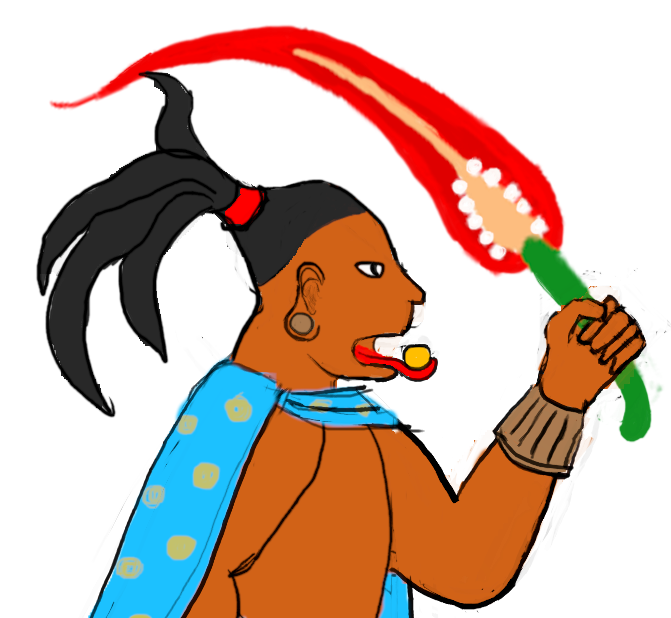The Impotent Scribe
Ngad i zerib (Zeribian language).
The Impotent Scribe
One day in the court of West Island Elderoak the king of Farens wanted to send a letter to the king of Wašleng. He had no Zeribian in his court to write in his language, so he sent his guards to find a scribe. "But be fast, I don't have all day!" He commanded, because he was an impatient man. The guards went looking. On their way to the shipyards, they ran into a Zeribian man."Can you write the Eastern language?" the guards asked. The man was no scribe, so he hesitated. But he was afraid of the guards too, and he saw that they were on the court's business, so he answered:
"Yes I can, my lords" They brought the ill-fated man back to the court. He saw the king seated on the throne. The vizier, the consul, and the high priest were also present. The man kneeled before them and did not dare to look at them.
“You brought a good and obeying man, it seems” the king remarked smiling, happy that the guards had returned so swiftly. “But stand up now, and come closer. I have this letter in my mind!”
The poor man got up all shaking. He was handed a scroll, a pen and an inkbottle. Luckily he was used to keeping good notes of his business, but he couldn't believe he was made to write on behalf of the King! He could feel the impatient gaze of the king on him, as he started dictating:
Say to Burwiš-Usahdeg Kageš the King of Washleng, my brother: For me all goes well. For you may all go well! For your wives, your sons, your house, your ships, your land may all go well! As a greeting, I have sent you 15 barrels of bronze, and sea silk! Me and my brother have made a mutual declaration of friendship. Just as our fathers were friends, we are friends now. Recently, my merchant ships, who were on their way to the Moons, were blundered on their way near the Serpent's Spine Islands, my men killed and robbed. Serpent's Spine is your country, and it’s kings are your vassals. Could you make your men stop? Sentence to death the men that put to death my men! When you do, I will send you more wonderous silk! Greetings, Elderoak
Once the letter was written, they let the poor Zeribian go, with rich presents of course, and send the letter on a journey with a royal delegation. After a week's travel the ships of Elderoak finally reached Wašleng. The King of Wašleng received the letter. His royal scribe cracked the seal open, and looked at the scroll. First he wasn't even sure what he was reading, but the longer he read, the more he blushed from shame. He tried to refuse reading it to his king, but he couldn’t defy his commands. When the king heard the message, he was enraged, and ordered the messengers to be cut into pieces and thrown to the bottom of the sea. This is how the letter read:
Say to Burwiš-Usahdeg Kageš the King of Wašleŋ, fishcutter, I am well. For your whores, your sons, your shed, your canoes, your mud, may all go well. As a teaching, I have sent you broken ships, deserved drinks of bloody stones and the clothes of a seamaggot! You and I have made a mutual declaration of friendship. I fill fuck you like my father did! Now my merchant ships, who were on their way to the Moons were blundered on their way at Snake's Back Islands, my men killed and robbed.Snake's Back is your land, and it's kings your slaves! Do you not know how to tell your men to stop? Kill the men that killed my men! When you do, I will send you more weird seamaggot clothes! Bye, Elderoak
The letter in Ngad i Zerib
This is the letter in the traditional Zeribian Script. The script is an abjad, a consonant script. The main letters are consonants, while the vowels are marked with diacritics (lines and dots) on the consonants. The script is read in vertical columns from left to right.
Ŋadur-ur ken Burwiš Usahdeg Kageš Iz i Wašleŋ, le-ze.
Ym zet uhah waš. Luhah waš ym den!
Luhah waš ym wanam-ige, ym čiš-ige, ym dem-ige,
ym gid-ige ym beth-ige.
Sumit rib bar griššumpeš ken den zezan, fylban basder,
neh ke i makqal i feren.
Set nex den, žep bet suryd 'exyr semex'.
Bar uwan žed-es, seŋewan.
Rim xar šummargid-es, i uŋkan ken Xim,
usaggeš ym saq ym Irin i Heš.
udrug zir-zir-es nex utelmar glar dewuš.
Irin i Heš beth-ige nex iz-iz i rim ŋar-ige.
Eneŋ i ewzanmit zir-ige?
Drug-ug dew i drugug zir-es.
Aŋ xar ewneŋ, sešummar nez gal ke i maqkal i feren.
Zeze, Elderoak
Fin engadur ken Burwiš Usahdeg Kageš Iz i Wašleŋ, lahi-ise.
Ym set uhah waš. Luhah waš ym den!
Luhah waš ym nana i den, ym čiš i den, ym ged i den,
ym zan i den ym derg i den.
Sumit rib bar zekanpeš ken den 15 (zežan) fylbanda arga,
nex terkweš ke.
Set nex den, bežep bet suryd 'exyr semex'.
Bar ukel žedes, seŋekel.
Rim xar šummarzan-es, i uŋkan ken Xim,
usaggeš ym saq ym Irin i Heš.
Udrug zir-ir-es nex telmar glar dewuš.
Irin i Heš beth i den nex iz-idu pal i den.
ekuž i ewzanmit zir i den
Fin edrughiz dew i udrug zir-es.
Aŋ xar ewneŋ, sešummar nez xleker terkweš ke.
Fin uxyr iz eze, Elderoak







I thoroughly enjoyed this story! I love how it really reads as an old folks tale, it is very consise and you can really feel how it would have been told orally through the generations. I'm also really fond of how a lot of the standard language words are used as obscene words in the dialects! Also, really nice work with all the information about the story and the language around it.
Thank you! <3 In addition to having read a lot of ancient literature in general, I also sped some time figuring out how actual ancient letters (Amarna letters to be specific) were structured. I'm glad you liked the extra information too, I was a bit worried since the others seem to only have posted pure prose, but this is a world building site after all so... :D